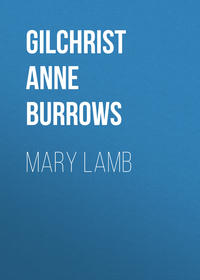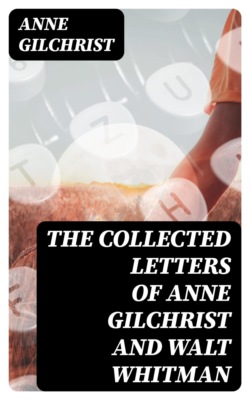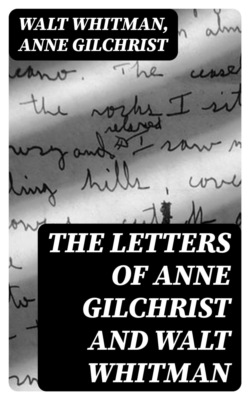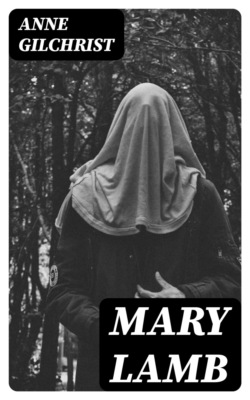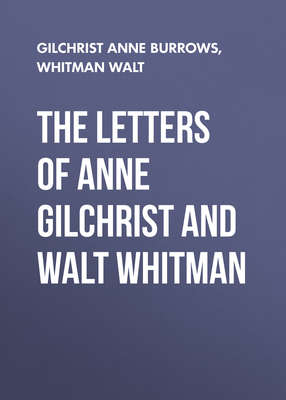Kitabı oku: «Mary Lamb», sayfa 6
"I would condole with you when the misfortune has befallen your poor leg; but such is the blessed distance we are at from each other that I hope, before you receive this, you have forgot it ever happened.
"Our compliments to the high ton at the Maltese court. Your brother is so profuse of them to me that, being, as you know, so unused to them, they perplex me sadly; in future I beg they may be discontinued. They always remind me of the free, and I believe very improper letter I wrote to you while you were at the Isle of Wight [that already given advising frankness]. The more kindly you and your brother and sister took the impertinent advice contained in it the more certain I feel that it was unnecessary and, therefore, highly improper. Do not let your brother compliment me into the memory of it again.
"My brother has had a letter from your mother which has distressed him sadly – about the postage of some letters being paid by my brother. Your silly brother, it seems, has informed your mother (I did not think your brother could have been so silly) that Charles had grumbled at paying the said postage. The fact was just at that time we were very poor having lost the Morning Post and we were beginning to practise a strict economy. My brother, who never makes up his mind whether he will be a miser or a spendthrift, is at all times a strange mixture of both" [rigid in those small economies which enabled him to be not only just but generous on small means]. "Of this failing the even economy of your correct brother's temper makes him an ill judge. The miserly part of Charles, at that time smarting under his recent loss, then happened to reign triumphant; and he would not write or let me write so often as he wished because the postage cost two and fourpence. Then came two or three of your poor mother's letters nearly together; and the two and fourpences he wished but grudged to pay for his own he was forced to pay for hers. In this dismal distress he applied to Fenwick to get his friend Motley to send them free from Portsmouth. This Mr. Fenwick could have done for half a word's speaking; but this he did not do! Then Charles foolishly and unthinkingly complained to your brother in a half-serious, half-joking way; and your brother has wickedly and with malice aforethought told your mother. O fye upon him! what will your mother think of us?
"I, too, feel my share of blame in this vexatious business; for I saw the unlucky paragraph in my brother's letter; and I had a kind of foreboding that it would come to your mother's ears – although I had a higher idea of your brother's good sense than I find he deserved. By entreaties and prayer I might have prevailed on my brother to say nothing about it. But I make a point of conscience never to interfere or cross my brother in the humour he happens to be in. It always appears to me to be a vexatious kind of tyranny that women have no business to exercise over men, which, merely because they having a better judgment, they have power to do. Let men alone and at last we find they come round to the right way which we, by a kind of intuition, perceive at once. But better, far better that we should let them often do wrong than that they should have the torment of a monitor always at their elbows.
"Charles is sadly fretted now, I know, at what to say to your mother. I have made this long preamble about it to induce you, if possible, to re-instate us in your mother's good graces. Say to her it was a jest misunderstood; tell her Charles Lamb is not the shabby fellow she and her son took him for but that he is, now and then, a trifle whimsical or so. I do not ask your brother to do this for I am offended with him for the mischief he has made.
"I feel that I have too lightly passed over the interesting account you sent me of your late disappointment. It was not because I did not feel and completely enter into the affair with you. You surprise and please me with the frank and generous way in which you deal with your lovers, taking a refusal from their so prudential hearts with a better grace and more good humour than other women accept a suitor's service. Continue this open artless conduct and I trust you will at last find some man who has sense enough to know you are well worth risking a peaceable life of poverty for. I shall yet live to see you a poor but happy English wife.
"Remember me most affectionately to Coleridge, and I thank you again and again for all your kindness to him. To dear Mrs. Stoddart and your brother I beg my best love; and to you all I wish health and happiness and a soon return to old England.
"I have sent to Mr. Burrel's for your kind present, but unfortunately he is not in town. I am impatient to see my fine silk handkerchiefs and I thank you for them not as a present, for I do not love presents, but as a remembrance of your old friend. Farewell.
"I am, my best Sarah,
"Your most affectionate Friend,"Mary Lamb."
"Good wishes and all proper remembrances from old nurse, Mrs. Jeffries, Mrs. Reynolds, Mrs. Rickman, &c. Long live Queen Hoop-oop-oop-oo and all the old merry phantoms."
Sarah Stoddart returned to England before the year was out. Coleridge remained in Malta, filling temporarily, at the request of Sir Alexander Ball, governor of the island, the post of public secretary till the end of September, 1805 when his friends lost track of him altogether for nearly a year; during which he visited Paris, wandered through Italy, Sicily, Cairo, and saw Vesuvius in December when "the air was so consolidated with a massy cloud-curtain that it appeared like a mountain in basso-relievo in an interminable wall of some pantheon"; and after narrowly escaping imprisonment at the hands of Napoleon, suddenly reappeared amongst his friends in the autumn of 1806.
To the Wordsworths, brother and sister and young wife, for the three were one in heart, this year of 1805 had been one of overwhelming sorrow. Their brother John, the brave and able ship's captain who yet loved "all quiet things" as dearly as William "although he loved more silently," and was wont to carry that beloved brother's poems to sea and con them to the music of the winds and waves; whose cherished scheme, so near fulfilment, it was to realise enough to settle in a cottage at Grasmere and devote his earnings to the poet's use so that he might pursue his way unharassed by a thought of money, – this brother was shipwrecked on the Bill of Portland just as he was starting, and whilst the ship was yet in the pilot's hands, on what was to have been, in how different a sense, his last voyage.
Six weeks beneath the moving sea
He lay in slumber quietly;
Unforced by wind or wave
To quit the ship for which he died
(All claims of duty satisfied);
And there they found him at her side,
And bore him to the grave.
After waiting awhile in silence before a grief of such magnitude Mary wrote to Dorothy Wordsworth. She speaks as one acquainted with a life-long sorrow yet who has learned to find its companionship not bitter: —
"I thank you, my kind friend, for your most comfortable letter; till I saw your own handwriting I could not persuade myself that I should do well to write to you though I have often attempted it; but I always left off dissatisfied with what I had written, and feeling that I was doing an improper thing to intrude upon your sorrow. I wished to tell you that you would one day feel the kind of peaceful state of mind and sweet memory of the dead which you so happily describe as now almost begun; but I felt that it was improper and most grating to the feelings of the afflicted to say to them that the memory of their affliction would in time become a constant part, not only of their dream, but of their most wakeful sense of happiness. That you would see every object with and through your lost brother and that that would at last become a real and everlasting source of comfort to you I felt and well knew from my own experience in sorrow; but till you yourself began to feel this I didn't dare tell you so; but I send you some poor lines which I wrote under this conviction of mind and before I heard Coleridge was returning home. I will transcribe them now, before I finish my letter, lest a false shame prevent me then for I know they are much worse than they ought to be, written as they were with strong feeling and on such a subject; every line seems to me to be borrowed: but I had no better way of expressing my thoughts and I never have the power of altering or amending anything I have once laid aside with dissatisfaction: —
Why is he wandering on the sea?
Coleridge should now with Wordsworth be.
By slow degrees he'd steal away
Their woe and gently bring a ray
(So happily he'd time relief)
Of comfort from their very grief.
He'd tell them that their brother dead,
When years have passed o'er their head,
Will be remembered with such holy,
True, and perfect melancholy,
That ever this lost brother John
Will be their heart's companion.
His voice they'll always hear,
His face they'll always see:
There's nought in life so sweet
As such a memory.
Thus for a moment are we permitted to see that, next to love for her brother, the memory of her dead mother and friendship for Coleridge were the deep and sacred influences of Mary's life.
CHAPTER VII
Mary in the Asylum again. – Lamb's Letter with a Poem of hers. – Her slow Recovery. – Letters to Sarah Stoddart. – The Tales from Shakespeare begun. – Hazlitt's Portrait of Lamb. – Sarah's Lovers. – The Farce of Mr. H
1805-6. – Æt. 41-2
The letter to Miss Wordsworth called forth a response; but, alas! Mary was in sad exile when it arrived and Charles, with a heart full of grief, wrote for her: —
"14th June 1805.
"Your long kind letter has not been thrown away (for it has given me great pleasure to find you are all resuming your old occupations and are better); but poor Mary, to whom it is addressed, cannot yet relish it. She has been attacked by one of her severe illnesses and is at present from home. Last Monday week was the day she left me and I hope I may calculate upon having her again in a month or little more. I am rather afraid late hours have, in this case, contributed to her indisposition… I have every reason to suppose that this illness, like all the former ones, will be but temporary; but I cannot always feel so. Meantime she is dead to me, and I miss a prop. All my strength is gone, and I am like a fool, bereft of her co-operation. I dare not think lest I should think wrong, so used am I to look up to her in the least as in the biggest perplexity. To say all that I know of her would be more than I think anybody could believe or even understand; and when I hope to have her well again with me it would be sinning against her feelings to go about to praise her, for I can conceal nothing that I do from her. She is older and wiser and better than I, and all my wretched imperfections I cover to myself by resolutely thinking on her goodness. She would share life and death, heaven and hell with me. She lives but for me; and I know I have been wasting and teasing her life for five years past incessantly with my cursed drinking and ways of going on. But even in this upbraiding of myself I am offending against her for I know that she has clung to me for better for worse; and if the balance has been against her hitherto it was a noble trade…
"I cannot resist transcribing three or four lines which poor Mary made upon a picture (a 'Holy Family') which we saw at an auction only one week before she left home. She was then beginning to show signs of ill-boding. They are sweet lines, and upon a sweet picture; but I send them only as the last memorial of her: —
Virgin and Child, L. da Vinci
Maternal lady, with thy virgin grace,
Heaven-born thy Jesus seemeth sure,
And thou a virgin pure.
Lady most perfect, when thy angel face
Men look upon, they wish to be
A Catholic, Madonna fair, to worship thee.
"You had her lines about the 'Lady Blanch.' You have not had some which she wrote upon a copy of a girl from Titian which I had hung up where that print of Blanch and the Abbess (as she beautifully interpreted two female figures from L. da Vinci) had hung in our room. 'Tis light and pretty: —
Who art thou, fair one, who usurp'st the place
Of Blanch, the lady of the matchless grace?
Come, fair and pretty tell to me
Who in thy life-time thou might'st be?
Thou pretty art and fair,
But with the Lady Blanch thou never must compare.
No need for Blanch her history to tell,
Whoever saw her face, they there did read it well;
But when I look on thee, I only know
There lived a pretty maid some hundred years ago.
"This is a little unfair, to tell so much about ourselves and to advert so little to your letter, so full of comfortable tidings of you all. But my own cares press pretty close upon me and you can make allowances. That you may go on gathering strength and peace is my next wish to Mary's recovery.
"I had almost forgot your repeated invitation. Supposing that Mary will be well and able there is another ability which you may guess at which I cannot promise myself. In prudence we ought not to come. This illness will make it still more prudential to wait. It is not a balance of this way of spending our money against another way but an absolute question of whether we shall stop now or go on wasting away the little we have got beforehand which my wise conduct has already encroached upon one half."
Pity it is that the little poem on the 'Lady Blanch' should have perished, as I fear it has, if it contained as 'sweet lines' as the foregoing.
Little more than a month after this (July 27), Charles writes cheerfully to Manning: —
"My old housekeeper has shown signs of convalescence and will shortly resume the power of the keys, so I shan't be cheated of my tea and liquors. Wind in the West which promotes tranquillity. Have leisure now to anticipate seeing thee again. Have been taking leave [it was a very short leave] of tobacco in a rhyming address. Had thought that vein had long since closed up. Find I can rhyme and reason too. Think of studying mathematics to restrain the fire of my genius which George Dyer recommends. Have frequent bleedings at the nose which shows plethoric. Maybe shall try the sea myself, that great scene of wonders. Got incredibly sober and regular; shave oftener and hum a tune to signify cheerfulness and gallantry.
"Suddenly disposed to sleep, having taken a quart of pease with bacon and stout. Will not refuse nature who has done such things for me!
"Nurse! don't call me unless Mr. Manning comes. – What! the gentleman in spectacles? – Yes.
Dormit. C. L.
"Saturday, Hot noon."
But although Mary was sufficiently recovered to return home at the end of the summer she continued much shaken by the severity of this attack and so also did her brother all through the autumn; as the following letters to Sarah Stoddart and still more one already quoted (pp. 75-6) show: —
September 1805.
"Certainly you are the best letter-writer (besides writing the best hand) in the world. I have just been reading over again your two long letters and I perceive they make me very envious. I have taken a bran new pen and put on my spectacles and am peering with all my might to see the lines in the paper which the sight of your even lines had well-nigh tempted me to rule; and I have moreover taken two pinches of snuff extraordinary to clear my head which feels more cloudy than common this fine cheerful morning.
"All I can gather from your clear and, I have no doubt, faithful history of Maltese politics is that the good doctor, though a firm friend, an excellent fancier of brooches, a good husband, an upright advocate and, in short, all that they say upon tombstones (for I do not recollect that they celebrate any fraternal virtues there) – yet is he but a moody brother; that your sister-in-law is pretty much like what all sisters-in-law have been since the first happy invention of the marriage state; that friend Coleridge has undergone no alteration by crossing the Atlantic [geography was evidently no part of Captain Starkey's curriculum] for his friendliness to you as well as the oddities you mention are just what one ought to look for from him; and that you, my dear Sarah, have proved yourself just as unfit to flourish in a little proud garrison town as I did shrewdly suspect you were before you went there.
"If I possibly can I will prevail upon Charles to write to your brother by the conveyance you mention; but he is so unwell I almost fear the fortnight will slip away before I can get him in the right vein. Indeed, it has been sad and heavy times with us lately. When I am pretty well his low spirits throw me back again; and when he begins to get a little cheerful then I do the same kind office for him. I heartily wish for the arrival of Coleridge; a few such evenings as we have sometimes passed with him would wind us up and set us going again.
"Do not say anything when you write of our low spirits; it will vex Charles. You would laugh or you would cry, perhaps both, to see us sit together looking at each other with long and rueful faces and saying 'How do you do?' and 'How do you do?' and then we fall a crying and say we will be better on the morrow. He says we are like tooth-ache and his friend gum-boil which, though a kind of ease, is but an uneasy kind of ease, a comfort of rather an uncomfortable sort.
"I rejoice to hear of your mother's amendment; when you can leave her with any satisfaction to yourself – which, as her sister, I think I understand by your letter, is with her, I hope you may soon be able to do – let me know upon what plan you mean to come to town. Your brother proposed your being six months in town and six with your mother; but he did not then know of your poor mother's illness. By his desire I enquired for a respectable family for you to board with and from Captain Burney I heard of one I thought would suit you at that time. He particularly desires I would not think of your being with us, not thinking, I conjecture, the house of a single man respectable enough. Your brother gave me most unlimited orders to domineer over you, to be the inspector of all your actions and to direct and govern you with a stern voice and a high hand; to be, in short, a very elder brother over you. Does the hearing of this, my meek pupil, make you long to come to London? I am making all the proper enquiries, against the time, of the newest and most approved modes (being myself mainly ignorant in these points) of etiquette and nicely correct maidenly manners.
"But to speak seriously. I mean, when we meet, that we will lay our heads together and consult and contrive the best way of making the best girl in the world the fine lady her brother wishes to see her and believe me, Sarah, it is not so difficult a matter as one is apt to imagine. I have observed many a demure lady who passes muster admirably well who, I think, we could easily learn to imitate in a week or two. We will talk of these things when we meet. In the meantime I give you free leave to be happy and merry at Salisbury in any way you can. Has the partridge season opened any communication between you and William? As I allow you to be imprudent till I see you, I shall expect to hear you have invited him to taste his own birds. Have you scratched him out of your will yet? Rickman is married and that is all the news I have to send you. I seem, upon looking over my letter again, to have written too lightly of your distresses at Malta; but, however I may have written, believe me I enter very feelingly into all your troubles. I love you and I love your brother; and between you, both of whom, I think, have been to blame, I know not what to say – only this I say, – try to think as little as possible of past miscarriages; it was perhaps so ordered by Providence that you might return home to be a comfort to your mother."
No long holiday trip was to be ventured on while Mary continued thus shaken and depressed. "We have been two tiny excursions this summer, for three or four days each, to a place near Harrow and to Egham where Cooper's Hill is and that is the total history of our rustication this year", Charles tells Wordsworth. In October Mary gives a slightly better account of herself: —
"I have made many attempts at writing to you, but it has always brought your troubles and my own so strongly into my mind, that I have been obliged to leave off and make Charles write for me. I am resolved now, however few lines I write, this shall go; for I know, my kind friend, you will like once more to see my own handwriting.
"I have been for these few days past in rather better spirits, so that I begin almost to feel myself once more a living creature and to hope for happier times; and in that hope I include the prospect of once more seeing my dear Sarah in peace and comfort in our old garret. How did I wish for your presence to cheer my drooping heart when I returned home from banishment.
"Is your being with or near your poor dear mother necessary to her comfort? Does she take any notice of you? And is there any prospect of her recovery? How I grieve for her, for you…
"I went to the Admiralty, about your mother's pension; from thence I was directed to an office in Lincoln's Inn… They informed me it could not be paid to any person but Mr. Wray without a letter of attorney… Do not let us neglect this business and make use of me in any way you can.
"I have much to thank you and your kind brother for. I kept the dark silk, as you may suppose. You have made me very fine; the brooch is very beautiful. Mrs. Jeffries wept for gratitude when she saw your present; she desires all manner of thanks and good wishes. Your maid's sister has gone to live a few miles from town. Charles, however, found her out and gave her the handkerchief.
"I want to know if you have seen William and if there is any prospect in future there. All you said in your letter from Portsmouth that related to him was so burnt in the fumigating that we could only make out that it was unfavourable but not the particulars; tell us again how you go on or if you have seen him. I conceit affairs will somehow be made up between you at last.
"I want to know how your brother goes on. Is he likely to make a very good fortune and in how long a time? And how is he in the way of home comforts – I mean is he very happy with Mrs. Stoddart? This was a question I could not ask while you were there and perhaps is not a fair one now; but I want to know how you all went on and, in short, twenty little foolish questions that one ought, perhaps, rather to ask when we meet than to write about. But do make me a little acquainted with the inside of the good doctor's house and what passes therein.
"Was Coleridge often with you? or did your brother and Col. argue long arguments till between the two great argue-ers there grew a little coolness; or perchance the mighty friendship between Coleridge and your Sovereign governor, Sir Alexander Ball, might create a kind of jealousy; for we fancy something of a coolness did exist from the little mention of C. ever made in your brother's letters.
"Write us, my good girl, a long gossiping letter answering all these foolish questions – and tell me any silly thing you can recollect – any, the least particular, will be interesting to us and we will never tell tales out of school; but we used to wonder and wonder how you all went on; and when you was coming home we said 'Now we shall hear all from Sarah.'
"God bless you, my dear friend… If you have sent Charles any commissions he has not executed write me word – he says he has lost or mislaid a letter desiring him to inquire about a wig. Write two letters – one of business and pensions and one all about Sarah Stoddart and Malta.
"We have got a picture of Charles; do you think your brother would like to have it? If you do, can you put us in a way how to send it?"
Mary's interest in her friend and her friend's affairs is so hearty one cannot choose but share it and would gladly see what "the best letter-writer in the world" had to tell of Coleridge and Stoddart and the long arguments and little jealousies; and whether 'William' had continued to dangle on, spite of distance and discouragement; and even to learn that the old lady received her pension and her wig in safety. But curiosity must remain unsatisfied for none of Miss Stoddart's letters have been preserved.
"The picture of Charles" was, we may feel pretty sure, one which William Hazlitt painted this year of Lamb 'in the costume of a Venetian senator.' It is, on all accounts, a peculiarly interesting portrait. Lamb was just thirty; and it gives, on the whole, a striking impression of the nobility and beauty of form and feature which characterised his head and partly realises Proctor's description – "a countenance so full of sensibility that it came upon you like a new thought which you could not help dwelling upon afterwards"; though the subtle lines which gave that wondrous sweetness of expression to the mouth are not fully rendered. Compared with the drawing by Hancock, done when Lamb was twenty-three, engraved in Cottle's Early Recollections of Coleridge, each may be said to corroborate the truth of the other, allowing for difference of age and aspect, – Hancock's being in profile, Hazlitt's (of which there is a good lithograph in Barry Cornwall's Memoir) nearly full face. The print from it prefixed to Fitzgerald's Lamb is almost unrecognisable. It was the last time Hazlitt took brush in hand, his grandson tells us; and it comes as a pleasant surprise – an indication that he was too modest in estimating his own gifts as a painter; and that the freshness of feeling and insight he displayed as an art critic were backed by some capacity for good workmanship.
It was whilst this portrait was being painted that the acquaintance between Lamb and Hazlitt ripened into an intimacy which, with one or two brief interruptions, was to be fruitful, invigorating on both sides and life-long. Hazlitt was at this time staying with his brother John, a successful miniature-painter and a member of the Godwin circle much frequented by the Lambs.
"It is not well to be very poor which we certainly are at this present," Mary had lately written. This it was which spurred her on to undertake her first literary venture, the Tales from Shakespeare. The nature of the malady from which she suffered made continuous mental exertion distressing and probably injurious; so that without this spur she would never, we may be sure, have dug and planted her little plot in the field of literature and made of it a sweet and pleasant place for the young where they may play and be nourished, regardless of time and change. The first hint of any such scheme occurs in a letter to Sarah Stoddart dated April 22, 1806, written the very day she had left the Lambs: —
"I have heard that Coleridge was lately going through Sicily to Rome with a party; but that, being unwell, he returned back to Naples. We think there is some mistake in this account and that his intended journey to Rome was in his former jaunt to Naples. If you know that at that time he had any such intention will you write instantly? for I do not know whether I ought to write to Mrs. Coleridge or not.
"I am going to make a sort of promise to myself and to you that I will write you kind of journal-like letters of the daily what-we-do matters, as they occur. This day seems to me a kind of new era in our time. It is not a birthday, nor a new year's day, nor a leave-off smoking day; but it is about an hour after the time of leaving you, our poor Phœnix, in the Salisbury stage and Charles has just left me to go to his lodgings [a room to work in free from the distraction of constant visitors just hired experimentally] and I am holding a solitary consultation with myself as to how I shall employ myself.
"Writing plays, novels, poems and all manner of such like vapouring and vapourish schemes are floating in my head which, at the same time, aches with the thought of parting from you and is perplext at the idea of I cannot tell what-about-notion that I have not made you half so comfortable as I ought to have done and a melancholy sense of the dull prospect you have before you on your return home. Then I think I will make my new gown; and now I consider the white petticoat will be better candle-light work; and then I look at the fire and think if the irons was but down I would iron my gowns – you having put me out of conceit of mangling.
"So much for an account of my own confused head; and now for yours. Returning home from the inn we took that to pieces and canvassed you, as you know is our usual custom. We agreed we should miss you sadly, and that you had been what you yourself discovered, not at all in our way; and although, if the postmaster should happen to open this, it would appear to him to be no great compliment yet you, who enter so warmly into the interior of our affairs, will understand and value it as well as what we likewise asserted that since you have been with us you have done but one foolish thing, vide Pinckhorn (excuse my bad Latin, if it should chance to mean exactly contrary to what I intend). We praised you for the very friendly way in which you regarded all our whimsies and, to use a phrase of Coleridge, understood us. We had, in short, no drawback on our eulogy on your merit except lamenting the want of respect you have to yourself, the want of a certain dignity of action, you know what I mean, which – though it only broke out in the acceptance of the old justice's book and was, as it were, smothered and almost extinct while you were here – yet is it so native a feeling in your mind that you will do whatever the present moment prompts you to do, that I wish you would take that one slight offence seriously to heart and make it a part of your daily consideration to drive this unlucky propensity, root and branch, out of your character. Then, mercy on us, what a perfect little gentlewoman you will be!!!
